Grocery stores require specialized hardware and software tools on top of standard point-of-sale (POS) software features, such as scale and scanner integrations, online grocery sales, self-checkout options, and lot and expiration date tracking. These extras typically come at a higher cost, but small grocers still have affordable POS options.
Based on our evaluation, the best grocery store POS systems are:
- IT Retail: Best overall
- POS Nation: Best scalable solution
- Clover: Best for flexible payment processing
- Square for Retail: Best for small or single-lane grocers
- Comcash: Best for high-volume grocers
All of these systems include subscriptions under $100, built-in payment processors, grocery-specific hardware options, and expiration date tracking.
Grocery Store POS Systems Compared
Our Score (out of 5) | Monthly Software Fee | POS Terminal Cost | Self-checkout | |
|---|---|---|---|---|
4.58 | $69-$149 | Included in higher plans | ✓ | |
4.41 | $69-$149 | $1,349+ (Kit) | ✓ | |
 | 4.14 | $60+ (Retail) | $1,699+ | ✓ |
3.91 | $0-$89 | $799 | ✓ (Square Stand Mount) | |
3.75 | $49+ | Included in plan | ✕ | |
IT Retail: Best Overall Grocery POS

Pros
- Multiple ecommerce integration options
- Supports bottle deposits and ID scans
- Variety of online grocery platforms and click-and-collect orders integrations
Cons
- Locked into IT Retail for payments
- May be too large a system for a small, single-lane market
- Expensive payment gateway fee
Overview
Who should use it:
IT Retail’s POS is tailor-made for independent groceries and markets of all sizes. The software can handle both a small footprint and large, multiple-lane grocery stores needing a variety of tools for bottle deposits, age verification, and online sales.
Why we like it:
IT Retail regularly appears as one of our top choices for a small business POS system, providing all the standard grocery-specific features that other systems lack or offer as a paid add-on—multiple-scale integration, bottle deposit management, marketing tools, and loyalty programs. IT Retail earned a score of 4.58 out of 5, earning a perfect score for hardware and basic POS functions and a near-perfect score for grocery features.
IT Retail lost some ground due to the cost of adding an online grocery store (setup will set you back $149, and the payment gateway is $250 monthly).
As with POS Nation, IT Retail lets you either build your own package for a custom quote; or opt for a pre-built package:
- Starter: $69/mo
- 24/7 support and training
- Lifetime warranty
- Growth: $99/mo
- Hardware kit including touch PC, barcode scanner, and receipt printer
- 2-year hardware warranty
- Premium: $149/mo
- Hardware kit including touch PC, barcode scanner, and receipt printer
- 2-year hardware warranty
- No long-term contracts
Regardless of the package you choose, you’ll need to commit to the IT Retail Processing Agreement. IT Retail currently does not disclose processing rates on its website.
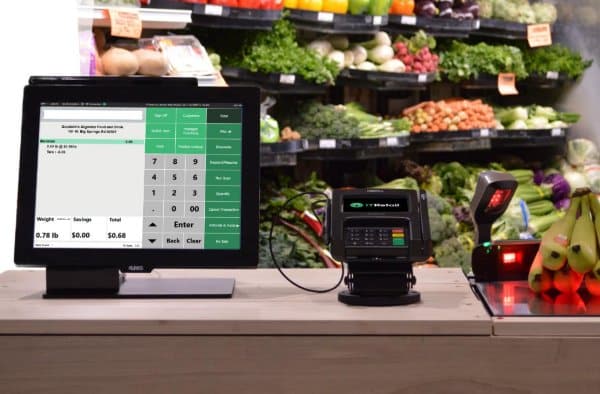
With card readers, scanners, and integrated scales, IT Retail terminals become a full-fledged grocery store checkout. (Source: IT Retail)
- Online grocery tools: IT Retail integrates with several online grocery and delivery services including Mercato, LocalExpress, Freshop, My Cloud, and Instacart.
- Employee tracking: The POS lets you track each employee’s voids, overrides, sales performance, and hours worked.
- Loyalty program: Customizable loyalty program allows for discounts and points earned per dollar spent.
- Bottle deposits and ID scans: Specific tools for bottle deposits, plus ID scanning for age verification when selling restricted items.
POS Nation: Best for Growing Independent Grocers & Markets

Pros
- Hardware included in higher plans
- No long-term contracts
- Supports multiple payment processors
- Supports bottle deposits and ID scans
Cons
- Does not support self-checkout
- Payment processing rates not listed on website
Overview
Who should use it:
POS Nation is a great choice for growing grocery stores that need a wide range of tools such as bottle deposits, age verification with ID scanning, coupons, and comprehensive reporting. You’ll also get the ability to build your own package, plus unlimited training.
Why we like it:
Overall, POS Nation earned a 4.41 out of 5 on our grocery ranking. This user-friendly grocery store POS system earned high marks for ease of use from our experts. On the other hand, it lost points for not supporting self-service kiosks. If these tools are important to you, consider IT Retail. POS Nation is a sister site to IT Retail, and it offers similar tools.
You can choose to build your own package with your preferred number of stations and hardware, for which you’ll receive a custom quote. Or, you can go with a pre-built package:
- Starter: $69/mo
- 24/7 support and training
- Lifetime warranty
- Growth: $99/mo
- Hardware kit including touch PC, barcode scanner, and receipt printer
- 2-year hardware warranty
- Premium: $149/mo
- Hardware kit including touch PC, barcode scanner, and receipt printer
- 2-year hardware warranty
- No hidden fees
POS Nation allows you to choose your own payment processor or use its in-house solution. It does not list its rates online.
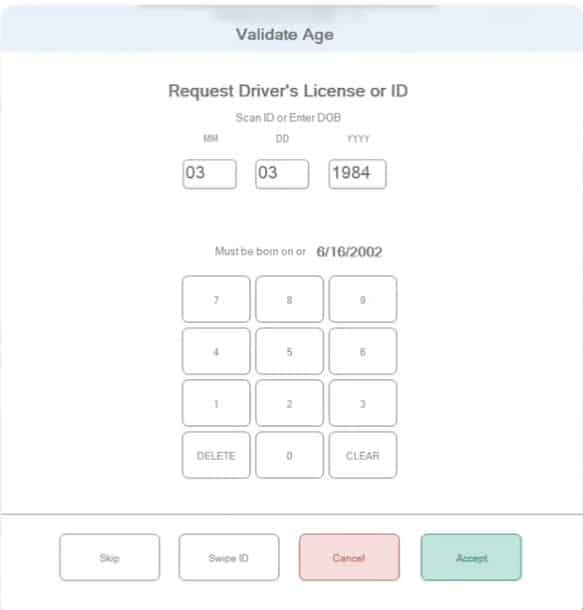
POS Nation prompts for birthday entry and ID scans for age-restricted product sales. (Source: POS Nation)
- Mobile POS option: You can process sales via mobile if you prefer this over a countertop POS. Mobile tablet devices are available.
- Strong inventory tools: You can mix and match product combos with the appropriate pricing, create purchase orders, and track case breaks and perishable inventory.
- Pre-made and customizable reports: POS Nation offers a huge number of pre-made reports with customizations to make sure you can access the information you need
Clover: Best for Flexible Payment Processing

Pros
- Built-in payment processor with third-party options
- Proprietary hardware available
- Good balance of basic and niche grocery POS functions
Cons
- Hardware is tied to merchant account
- Little oversight of third-party resellers
- Some grocery-specific tools are limited
Overview
Who should use it:
Clover is a good choice for groceries with large inventories that need solid inventory management and expiration tracking, the ability to choose a payment processor, and rugged, purpose-built proprietary hardware.
Why we like it:
Clover makes things flexible and easy for you by offering a built-in payment processor, but also letting you reprogram to one of your choice. Each POS plan comes with its own set of proprietary hardware for countertop or mobile transactions. With Clover, you can track inventory expiration dates, use scales and scanners, set up a self-checkout system, and build a loyalty program. You’ll also get 24/7 customer support.
Clover offers different packages and pricing for different industries—full- and quick-service restaurants, professional services, and more. The pricing listed here is for retail businesses in particular.
- Starter: $60/mo for 36 months or $799 + $14.95/mo
- Essentials software plan
- Mini touch-screen POS with printer
- Inventory management, reporting
- Standard: $135/mo for 36 months or $1,799 + $49.95/mo
- Register software plan
- Countertop POS with printer and cash drawer
- Item variants and cost tracking
- Advanced: $190/mo for 36 months or $2,398 + $69.90/mo
- Register software plan
- Countertop POS and handheld POS included
- Item variants and cost tracking
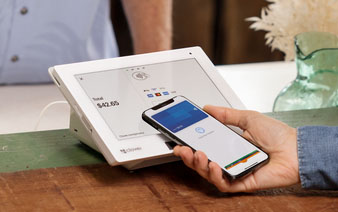
Even Clover’s basic subscription will get you a proprietary handheld POS device that lets you manage inventory and view reports. (Source: Clover)
- Website builder: Clover includes an online ordering tool that lets your customers order groceries via a custom website. You can also offer buy online, pick-up in-store (BOPIS) services to customers who purchase online.
- Loyalty app: Clover offers a free customer-facing loyalty app that incentivizes customers to purchase regularly.
Square for Retail: Best for Small or Single-lane Grocers

Pros
- No long-term contracts
- Lots of countertop and handheld hardware options
- Free baseline POS
- Self-checkout via Square Stand Mount
Cons
- Square is the only payment processor
- Age verification tools are not strong
- Customer service is not 24/7 for free users
Overview
Who should use it:
Square for Retail is great for small or single-lane grocery stores wanting a free POS option that works on mobile. There’s a free plan if your needs are simple, but the paid plan includes inventory with stock forecasting, vendor management, and more.
Why we like it:
Square earned an overall score of 3.91 out of 5 on our grocery store POS criteria. It didn’t get a perfect score in our pricing category because you must use the built-in payment processing.
Additionally, it lost points because it does not have a lot of grocer-specific features. Square cannot process bottle deposits and does not have any age-restricting tools for alcohol or tobacco sales.
Square for Retail is super easy to set up and use, and it has free ecommerce tools for setting up an online grocery store. It’s not as complete as other grocery POS on our list but offers a lot of functionality for a good price. Finally, the Square ecosystem includes add-ons from scheduling to payroll and even banking.
- Free: Basic retail POS app, online store, basic inventory for unlimited items
- In-person payment processing: 2.6% + 10 cents
- Online payment processing: 2.9% + 30 cents
- Plus ($89 per month): Free plan features plus advanced inventory, advanced reports, team management
- In-person payment processing: 2.5% + 10 cents
- Online payment processing: 2.9% + 30 cents
- Premium (Custom-quoted): Plus Plan plus payroll, loyalty, marketing, and account management
- Custom payment processing
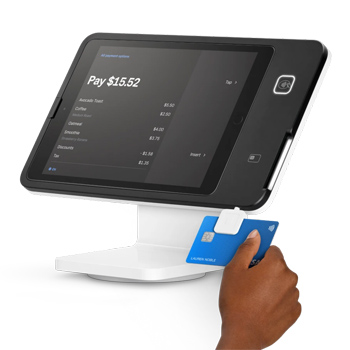
You can convert your iPad into a POS using the Square Stand built-in card tap and chip reader, plus optional magstripe reader. (Source: Square)
- Free POS system: Square’s free POS system is basic, but hearty, with unlimited products and modifications, general inventory tools, customer management, discounts, and more.
- Self-checkout via Square Stand Mount: Use this mount to attach your iPad POS system to any wall or countertop to give customers a self-checkout option.
- Online grocery ordering: Square has a free online store builder that you can design for grocery sales. You’ll also get real-time inventory sync, with all information displayed on your central POS dashboard.
- Workforce management: Square’s higher-tier plans include team management tools to manage your employee hours, scheduling, and payroll.
Comcash: Best for High-volume Grocers

Pros
- Operates on Windows-based hardware
- Digital receipt options
- Detailed forecasting tools
Cons
- Locked into IT Retail for payment processing
- Customer support is not 24/7
- No self-checkout
Overview
Who should use it:
High-volume grocers will appreciate the granular features that Comcash has, including bottle deposit processing, ID scanning, expiration date tracking, and more. Grocery stores wanting to sell online will also find this system’s strong webstore useful.
Why we like it:
Comcash works on Windows-based hardware, so it’s a versatile system that you can use with just about any device. However, it also has all the grocery-store functions you need, from bottle deposits to loyalty programs that don’t require cards or special member numbers.
As part of the IT Retail family (along with POS Nation), it’s little wonder that Comcash ranks high with its sister products. It earned an overall score of 3.75 out of 5, with high scores for hardware and basic functions as well as niche grocery features.
It has a strong webstore that fully integrates with the in-house POS system, although it no longer lists this capability in the build-and-price; you’ll need to call for a quote. It lost points on pricing because it offers only a single plan and one usable payment processor.
Comcash has a build-and-price system similar to IT Retail and POS Nation, as well as a single bundled plan.
The Freedom Premium bundled plan goes for $49 per month and includes a widescreen touch PC plus accessories like a receipt printer and barcode scanner. You get a two-year hardware warranty but must commit to the Comcash processing agreement.
Here are some other prices we found:
Hardware costs: From $159, payment terminals from $599 to $749
One-time installation fees: Custom-quoted
Processing fees: Custom-quoted
Ecommerce: Custom-quoted
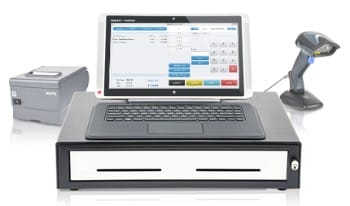
You can operate your Comcash POS software from a simple Windows-enabled tablet. (Source: Comcash)
- Marketing and loyalty: Customers can earn points for purchases; you can also use the loyalty system to send targeted emails and coupons or promote new items.
- Integrated online store: The system’s integrated online store syncs with your in-store inventory and loyalty program. It also tracks stock in real time and lets customers search for items by kind or brand and schedule in-store pickups
- Flexible hardware: You can operate your Comcash POS on low-profile touch-screen Windows tablets, and you can also get integrated scanners and scales. Self-checkout terminals are another option as are handheld inventory scanners that speed up order receiving and inventory counts.
- Customer display: You can run advertising or messages for the checkout customer until the time of sale. Then, it will prompt a customer for their loyalty or to enroll with just the phone number. It also lets customers see their loyalty account and information, so they can check points or update if needed.
How to Choose a Point-of-Sale System for a Grocery Store
A good grocery store POS system should include standard features such as inventory management, reports, online sales, and more. However, you’ll also need to look for specialized tools that help you run a grocery. Follow these steps to pinpoint the best POS software for your grocery.
Step 1: Set a Budget
Naturally, you need to consider costs. We found POS systems for grocery stores that were as low as $39 a month and as high as $18,000 to start. For our list, we looked for affordable options that can handle multiple lanes while also including hardware, when possible.
Step 2: Choose Your Must-have Features
For grocery store POS software, be sure to look for the following:
- Advanced inventory management systems that can track expiration dates, bottle deposits, and case breaks
- Reports for sales, inventory, and employee hours
- Easy item lookup or photos (especially for produce)
- Employee time clock and register close out functions
- Ability to take coupons or create discounts
- ID check reminders or verification tools (if you sell age-restricted products)
- Loyalty programs that are easy to use, such as ID by phone number
- Scanner and scale integrations
- Integrated payment processing
- Online grocery ordering with delivery and pickup (in-house or via delivery integration)
It’s also useful to have the ability to capture email addresses for marketing and other CRM functions.
For hardware, consider how many checkout lanes you need for your grocery store. Barcode scanners make taking inventory and ringing up sales easier, and scales are vital for items like produce, cheeses, or deli meats. Larger establishments like supermarkets might need self-checkout kiosks to manage long queues.
Step 3: Make a Shortlist
Have a list of the top POS systems you are considering. Make sure they each have your must-have features. Note any other stand-out features or drawbacks that they have. Being able to look at your contenders side-by-side will help make your final decision easier.
Step 4: Compare Specific Quotes & Product Demos
Once you have your choice narrowed down to a few options, reach out to each company directly for a custom quote and a demo.
During the product demo, ask to walk through all of the major tasks both management and associates will need to complete each day so that you get a sense of the workflows. Also ask about the installation process and fees, setup time, and whether or not you will be eligible for dedicated customer support.
Having your top choices laid out side-by-side will also help you negotiate lower rates – some POS companies will match competitor pricing. It will also make it easier for you to ask questions about missing or lackluster features.
Step 5: Get Staff Feedback
When your list is finalized, get feedback from key staff members like your store manager, department managers, and lead cashiers. If you have a trial or a recording of product demos, give them access.
Since your staff will be the ones using your POS system the most on a day-to-day basis, they can likely provide nuanced feedback. And, rolling out your system will go a lot smoother if you have buy-in from your employees.
How We Evaluated Grocery POS
Grocery stores need a POS system that can handle large volumes of perishable inventory, track and manage employees, and build shopper loyalty with customer relationship management (CRM) features. It also needs durable and industry-specific hardware, including options for scale and scanner integrations. With increasing customer demand for online ordering, ecommerce tools are quickly becoming a must-have feature too.
IT Retail emerged as the best grocery store POS system for markets of all sizes. The software received the highest overall score based on our criteria, earning a 4.58 out of 5 for its affordable monthly cost, perishable inventory tracking, tools for online grocery sales, and robust CRM feature set.
Click through the tabs below for our full evaluation criteria:
20% of Overall Score
Groceries and small markets operate with tight margins. So first, we considered each system’s overall cost. We looked for integrated payment processing and awarded the highest points to systems that integrate with multiple processors so users can shop for the best processing rates.
20% of Overall Score
We looked for systems that use durable, market-specific hardware like scales, scanners, and self-checkout tools. Because markets typically have a roster of staff to manage, we awarded points to systems that go beyond basic timekeeping and support employee scheduling as well. All did well, but only IT Retail earned a perfect score.
30% of Overall Score
Groceries have tens of thousands of products, so we looked at systems that have robust inventory management tools and can account for variables like expiration dates and first-in, first-out (FIFO) schedules. Since several states require grocers to collect and distribute non-taxed bottle deposits, we looked for systems that handle this fluently.
For markets that also sell age-restricted products like alcohol and tobacco products, we looked for age-verification tools. We also examined what CRM features—such as loyalty programs, custom coupons, and marketing tools—and ecommerce tools are included.
10% of Overall Score
We prioritized systems that include 24/7 customer support. We also considered what type of support is available—do they have a phone number you can call or is communication only via email? And since service slowdowns can negatively impact a grocer’s bottom line, we also looked for systems that are cloud-based with hybrid installation or a robust offline mode. POS Nation, Clover, and IT Retail got the highest scores.
20% of Overall Score
Frequently Asked Questions (FAQs)
Click through the following sections to learn more about grocery POS systems, and their pricing and available features.
Typically, yes. Most modern POS systems, and the ones we usually recommend, are cloud-based or hybrid installation POS. These operate on a software-as-a-service (SaaS) model that typically requires a monthly fee.
The cost of setting up a POS for grocery stores depends on your requirements. Software will average $100 per month per terminal, and you’ll be paying more if you need kiosks, self-checkout, or industry-grade scales or scanners.
If you can sell groceries online without sacrificing your margins to the point of not being profitable, you should absolutely sell online. US online grocery sales reach over $8 billion every month, and it’s a growing market.
Bottom Line
IT Retail has all the tools an independent grocer needs. This user-friendly system arrives preprogrammed and includes robust customer loyalty tools, detailed inventory management, and the ability to scan IDs and process bottle deposits. With an affordable baseline price and customizable hardware, this POS can support small markets or expand as your business grows. To see if this POS is the right fit for your grocery operation, visit IT Retail for a demo.